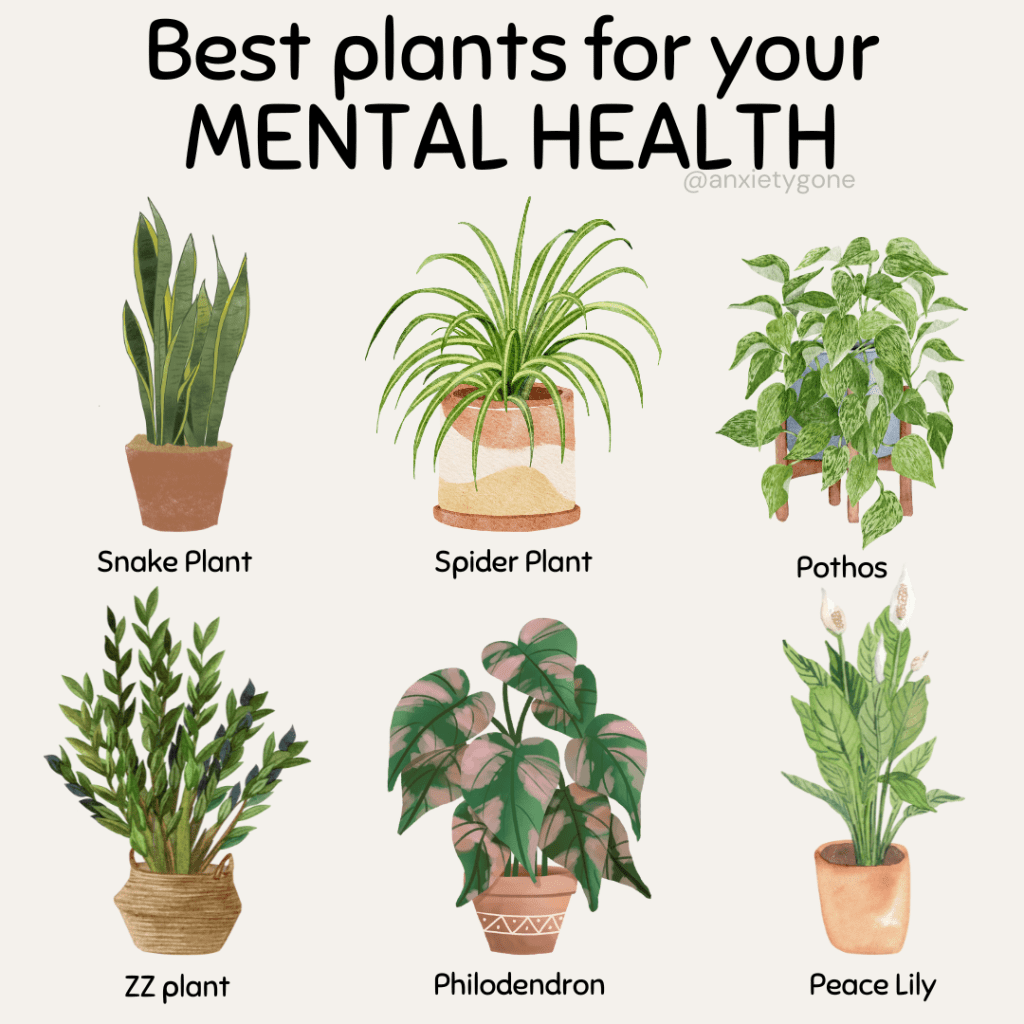Full Disclosure: Clicking on these links could mean a tiny commission for me, at no extra cost to you.
In our fast-paced world, anxiety and stress are as common as coffee shops on city corners. But what if the solution could be as natural as the earth under our feet? Plant medicine, with its deep roots in ancient traditions, offers an abundance of natural remedies that promise to calm the mind, soothe the soul, and restore balance without the side effects often associated with pharmaceuticals. From the fragrant lavender fields to the sacred ashwagandha herb, nature’s bounty is rich with options for those seeking respite from the clutches of anxiety and stress. Whether it’s picking up a nice green plant from your local nursery or sending a flower delivery in Colorado to brighten up your friend’s day, this blog will guide you through the wonderful world of plant medicine and herbal remedies.
Understanding the Therapeutic Power of Plants
- Medicinal Properties
Many plants contain compounds with medicinal properties, which have been used for centuries in traditional medicine systems around the world. For example, aspirin was originally derived from willow bark, and the anti-malarial drug quinine comes from the bark of the cinchona tree. - Nutritional Value
Plants provide essential nutrients such as vitamins, minerals, and antioxidants that are crucial for maintaining health and preventing diseases. Fruits, vegetables, grains, nuts, and seeds are all important components of a balanced diet. - Aromatherapy
Certain plants produce essential oils that have therapeutic effects when inhaled or applied to the skin. Aromatherapy can help alleviate stress, improve mood, promote relaxation, and relieve symptoms of various conditions such as headaches and insomnia. - Physical Healing
Some plants have healing properties that can help with wound healing, pain relief, reducing inflammation and even treating physical anxiety symptoms. Aloe vera, for example, is known for its ability to soothe burns and skin irritations. - Mental Health Benefits
Spending time in nature or caring for indoor plants has been shown to have positive effects on mental health, reducing stress, anxiety, and depression. This connection to nature, known as biophilia, is thought to have evolutionary roots and is fundamental to human well-being. - Air Purification
Certain plants are excellent air purifiers, removing toxins and pollutants from indoor environments. This not only improves air quality but also contributes to overall health and well-being by reducing the risk of respiratory problems and other health issues associated with indoor air pollution. - Connection to Nature
Simply being in the presence of plants or surrounded by greenery can have therapeutic effects, promoting relaxation, restoration, and a sense of connection to the natural world. This connection is increasingly recognized as important for human health and happiness in our modern, urbanized societies.
Overall, the therapeutic power of plants is vast and multifaceted, encompassing physical, mental, emotional, and even spiritual aspects of human health and well-being. Integrating plants into our lives, whether through diet, herbal medicine, aromatherapy, or simply spending time in nature, can have profound benefits for our health and quality of life.
Creating Your Botanical Sanctuary at Home
Selecting plants for your home involves considering factors such as ease of care, air-purifying properties, and aesthetic appeal. Here are some tips to help you choose the right plants:
- Low Maintenance: Opt for plants that are easy to care for and don’t require a lot of attention. This is especially important if you’re new to plant parenting or have a busy lifestyle. Some low-maintenance options include snake plants, pothos, spider plants, and succulents.
- Air-Purifying Plants: Choose plants that have been shown to improve indoor air quality by removing toxins and pollutants. NASA’s Clean Air Study identified several houseplants with air-purifying abilities, including peace lilies, snake plants, spider plants, and Boston ferns. These plants can help create a healthier indoor environment, which can positively impact mental well-being.
- Aromatic Plants: Consider incorporating aromatic plants into your home, as their pleasant scents can have a calming effect on the mind. Lavender, jasmine, rosemary, and eucalyptus are examples of plants with soothing fragrances that can promote relaxation and reduce stress.
- Visual Appeal: Choose plants that you find visually appealing and that bring you joy. Surrounding yourself with plants that you love to look at can have a positive impact on your mood and mental health. Consider factors such as leaf color, texture, and shape when selecting plants for your home.
- Biophilic Design: Incorporate plants into your home decor in a way that enhances your connection to nature. Integrate plants into different rooms of your home, including living spaces, bedrooms, and even the bathroom, to create a sense of tranquility and rejuvenation.
- Personal Preferences: Ultimately, choose plants that resonate with you personally and that align with your preferences and lifestyle. Whether you prefer lush tropical plants, sleek modern succulents, or charming flowering varieties, selecting plants that you love will enhance your enjoyment and benefit your mental health.
By carefully selecting plants for your home with a focus on mental health, you can create a peaceful and uplifting environment that supports your overall well-being. Experiment with different plants and arrangements to find what works best for you, and enjoy the many benefits that indoor gardening can bring to your life.
Plants for a Peaceful Space
When choosing plants for the office with a focus on productivity, it’s important to consider factors such as air-purifying properties, ease of care, and aesthetic appeal. Here are some plants that are well-suited for the office environment:
- Snake Plant (Sansevieria): Snake plants are excellent air purifiers, removing toxins such as formaldehyde and benzene from the air. They’re also incredibly resilient and can thrive in low light conditions, making them perfect for office spaces with limited natural light.
- Spider Plant (Chlorophytum comosum): Spider plants are known for their air-purifying abilities and are particularly effective at removing formaldehyde from indoor air. They’re easy to care for and can tolerate a wide range of conditions, making them ideal for office environments.
- Peace Lily (Spathiphyllum): Peace lilies are beautiful plants with lush, green foliage and elegant white flowers. They’re excellent at removing toxins like formaldehyde, benzene, and trichloroethylene from the air, and they thrive in low to moderate light conditions.
- ZZ Plant (Zamioculcas zamiifolia): ZZ plants are extremely low maintenance and can tolerate neglect, making them perfect for busy office environments. They’re also excellent at purifying the air and can thrive in low light conditions.
- Pothos (Epipremnum aureum): Pothos is a versatile plant that is well-suited for offices due to its ability to thrive in low light and tolerate neglect. It’s also an excellent air purifier, removing toxins such as formaldehyde and benzene from the air.
- Philodendron: Philodendrons are easy to care for and come in a variety of shapes, sizes, and colors, making them a popular choice for office environments. They’re also effective at purifying the air and can thrive in low to moderate light conditions.
- Succulents: Succulents are low-maintenance plants that come in a wide range of shapes and sizes, making them a versatile option for office spaces. They require minimal watering and can thrive in bright, indirect light.
In addition to their air-purifying properties and ease of care, incorporating plants into the office environment can also have psychological benefits, such as reducing stress, improving mood, and increasing productivity. Experiment with different plants and arrangements to find what works best for your office space, and enjoy the many benefits that indoor plants can bring to the workplace.
Plants for their Soothing Scents
Plants used in aromatherapy typically have fragrant essential oils that are extracted and used for therapeutic purposes. Here are some popular plants used in aromatherapy:
- Lavender (Lavandula angustifolia): Lavender is one of the most well-known plants used in aromatherapy for its calming and relaxing properties. Its sweet, floral scent is often used to promote relaxation, reduce stress and anxiety, and improve sleep quality.
- Peppermint (Mentha × piperita): Peppermint essential oil has a refreshing and invigorating scent that is known for its ability to enhance focus, concentration, and mental clarity. It can also help relieve headaches, soothe nausea, and alleviate respiratory congestion.
- Eucalyptus (Eucalyptus globulus): Eucalyptus essential oil has a fresh, minty aroma with invigorating and decongestant properties. It is commonly used to clear the sinuses, alleviate respiratory symptoms, and promote deep breathing. Eucalyptus can also help boost energy and mental alertness.
- Rosemary (Rosmarinus officinalis): Rosemary essential oil has a woody, herbaceous scent that is known for its stimulating and uplifting properties. It can improve focus, memory, and cognitive function, making it a great choice for studying or working. Rosemary oil is also believed to promote mental clarity and reduce mental fatigue.
- Chamomile (Matricaria chamomilla): Chamomile essential oil has a sweet, fruity aroma with calming and soothing properties. It is often used to promote relaxation, reduce anxiety, and improve sleep quality. Chamomile oil can also help alleviate digestive discomfort and soothe skin irritation.
- Lemon (Citrus limon): Lemon essential oil has a bright, citrusy scent that is energizing and uplifting. It can help improve mood, increase mental clarity, and boost focus and concentration. Lemon oil is also believed to have cleansing and purifying properties when used in aromatherapy.
- Ylang Ylang (Cananga odorata): Ylang ylang essential oil has a rich, floral scent that is known for its relaxing and aphrodisiac properties. It can help reduce stress, anxiety, and tension, promote relaxation, and improve mood. Ylang ylang oil is often used in aromatherapy blends designed to induce feelings of calm and contentment.
When using essential oils for aromatherapy, it’s important to dilute them properly and follow safety guidelines to avoid adverse reactions. Additionally, individual preferences and sensitivities may vary, so it’s a good idea to test a small amount of oil before using it extensively.
Start a Medicinal Garden
Ready to harness the therapeutic power of plant medicine for your mental well-being even further? Explore the Medicinal Garden digital program and unlock the secrets to cultivating a healthier mind through nature’s remedies. Start your journey to inner peace and vitality today!










